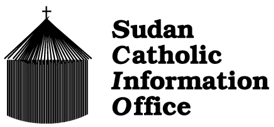Khartoum Catholic institution raided
People suspected to be Sudanese security agents on October 29, 1999 stormed the information division of the Catholic Secretariat in Khartoum and confiscated a number of items, leaving a wave of destruction on their trail.
A fax message from the Secretariat to the Sudan Catholic Information Office in Nairobi indicated that among the items taken away from the Church office were two computers, one of them an IBM donated recently to the office by the Vatican for the Year 2000 Jubilee. No programme had been installed on the computer. The other computer confiscated was for general office work.
On the fateful morning, explained the message, a man who identified himself only as Charles knocked at the gate of the Secretariat but when the guard on duty opened, 10 other men forced their way in. They beat the guard, tied him up then drove their Toyota pick-up inside the Church institution. The men, six in khaki uniform and the rest in plain clothes and who were all armed, then proceeded to break all the doors to the communication department.
The incident was reported to the police who termed it an ordinary burglary and promised to investigate it.
Though the motive behind the raid was not clear, a Secretariat official, who declined to be named for security reasons, said that it was not an isolated incident but part of Khartoum's grand plan to intimidate Christians and frustrate the growth of the Church.
He said the raid could not have been an ordinary act of thuggery as those involved in it were in uniform, well organised and seemed to target very specific items.
Last May, the Secretariat suffered a similar misfortune when suspected government agents stormed its trans-receiver radio room and took away the aerial.
The manner the predominantly Islamic government treats the Christians and their institutions remains a contentious issue.
Whereas Khartoum maintains that there is freedom of worship in Africa's most expansive state, the reality on the ground indicates otherwise.
The radical Muslim government for unexplained reasons expelled last August, a Canadian priest who had worked in Sudan for seven years.
Father Gilles Poirier, 57, was escorted by police to Khartoum airport and put on a plane bound for Canada by unidentified persons. The expulsion came after Fr Poirier had been summoned to the Department of Immigration on July 15 and told he had two weeks to leave the country.
Father Poirier worked in the slums outside Khartoum where he administered development loans for the poor to open businesses.
The Canadian clergy lived in the same parish where Father Lino Sebit, a Sudanese, was arrested last year and charged with 25 others with a series of bomb attacks in Khartoum. He is still on trial in a military court.
Other incidents that have been viewed as persecution directed against the Church in Sudan include the confiscation of the Catholic Club in central Khartoum by the government. The Catholic institution has since been made the headquarters of the ruling National Congress Party.
A piece of land belonging to the Episcopal Church of Sudan at Omdurman has also suffered similar fate.
Charles Omondi
----------------------------------------------------------------------
SUDAN CATHOLIC INFORMATION OFFICE
Bethany House, P. O. Box 21102, Nairobi, Kenya
tel. +254.2.577595 or 577949, fax 577327
e-mail: [email protected]
----------------------------------------------------------------------
For further information, please contact:
Fr. Kizito, SCIO, tel +254.2.577595 - fax +254.2.577327 - e-mail: 
